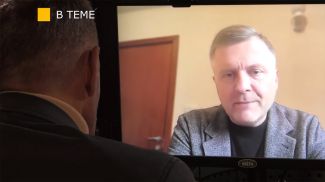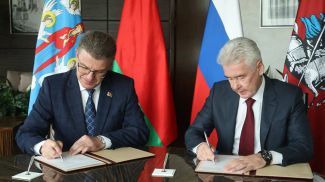
MINSK, 18 October (BelTA) – Belarus is set to take part in the Eurasian Data Protection Congress which is due to be held online in three countries – Belarus, Russia and Kazakhstan on 24-25 October, BelTA learned from the National Personal Data Protection Center of Belarus.
The event is organized by personal data protection communities and associations. The congress offers a platform for professional meetings, exchange of experience and knowledge at the international level.
Taking part in the event will be experts, companies, state and public organizations dealing with personal data protection and information security.
According to Olga Shibko, Deputy Head of the Department of Educational Services and Public Relations of the National Personal Data Protection Center, the congress is a non-commercial event. Participants will discuss data protection strategies, trends in big data processing, information security, legislative initiatives and the role of DPOs (data protection officers) in business.
The National Personal Data Protection Center will provide information about the legislative regulation, practice of implementing data protection measures in organizations, successful cases of personal data protection.
“Belarus follows its own path, its own informal and non-trivial approaches based on the correlation of dialogue and responsibility in personal data protection,” Olga Shibko said. “The Belarusian law on personal data protection forms a unified system of legal regulation of relations in this area that meets the realities. At the same time, we are not talking about establishing any prohibitions on processing personal data, but about ensuring the balance of interests of organizations (according to the law - operators), processing personal data for their own purposes, and citizens.”
According to Olga Shibko, in the last decade personal data has largely acquired economic value for operators and in some cases has been used without people's consent (to promote goods, works or services). The law allows citizens to influence what rightfully belongs only to them. An important place is given to the protection of data during processing, including in information resources and systems.
The event is organized by personal data protection communities and associations. The congress offers a platform for professional meetings, exchange of experience and knowledge at the international level.
Taking part in the event will be experts, companies, state and public organizations dealing with personal data protection and information security.
According to Olga Shibko, Deputy Head of the Department of Educational Services and Public Relations of the National Personal Data Protection Center, the congress is a non-commercial event. Participants will discuss data protection strategies, trends in big data processing, information security, legislative initiatives and the role of DPOs (data protection officers) in business.
The National Personal Data Protection Center will provide information about the legislative regulation, practice of implementing data protection measures in organizations, successful cases of personal data protection.
“Belarus follows its own path, its own informal and non-trivial approaches based on the correlation of dialogue and responsibility in personal data protection,” Olga Shibko said. “The Belarusian law on personal data protection forms a unified system of legal regulation of relations in this area that meets the realities. At the same time, we are not talking about establishing any prohibitions on processing personal data, but about ensuring the balance of interests of organizations (according to the law - operators), processing personal data for their own purposes, and citizens.”
According to Olga Shibko, in the last decade personal data has largely acquired economic value for operators and in some cases has been used without people's consent (to promote goods, works or services). The law allows citizens to influence what rightfully belongs only to them. An important place is given to the protection of data during processing, including in information resources and systems.













